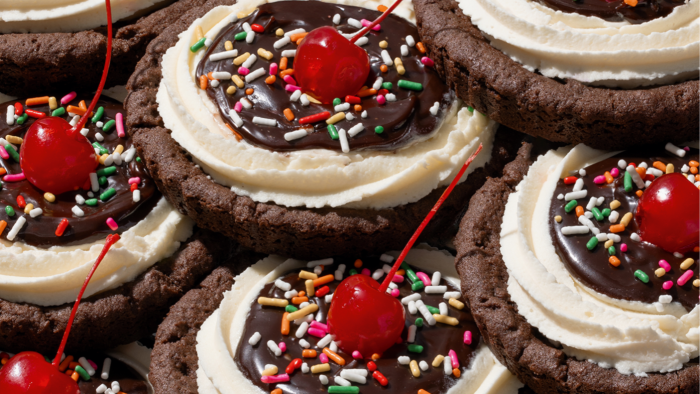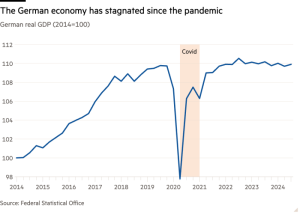Really smart cookies

Unlock the Editor’s Digest for free
Roula Khalaf, Editor of the FT, selects her favourite stories in this weekly newsletter.
Recently I visited a shop in south London called Cöödie that looks like an Apple store but actually sells biscuits. The wife of one of the owners happened to be helping out that day and took me through the options: sobrassada, Mahon cheese and honey; hoisin, white and ruby chocolate; brie, pear and pecan nut; dark chocolate and basil; cheddar and bacon. This last one was particularly delicious: a bit salty and smoky with a lingering smack of cheese. The wife told me she worked as a dentist – the irony of her peddling cookies on her day off wasn’t lost on us. But even the strictest dentist would find it hard not to endorse cookies as good as these.
Cöödie (@coodielondon) is the brainchild of four London-based Spanish friends who previously worked in aviation and hospitality. They shared an obsession with cookies and felt the available options were dull. The name is a portmanteau of “cookie” and “foodie” with two umlauts thrown in for visual impact and phonetic mischief. “A cöödie is a person who has an ardent or refined interest in cookies, and who eats cookies not only out of hunger but also as a hobby,” they told me.


In the hands of chef Cristina Garcia, who hails from Bilbao, the kitchen has become a hub for experimentation. Currently in development are creations made with spicy mango, beetroot, mascarpone and a cookie based on torrija trufada (a Spanish-style caramelised French toast). Also on the cards are wine evenings where cookies will be paired with sweet and sparkling wine.
Cookies have come a long way. Those of us with a sweet tooth increasingly hunger for cookies that are bigger, brighter and bolder. Historically, of course, cookies were mostly the preserve of weddings and holidays. But with the spread of industrialised products like baking powder and chocolate chips in the 1950s, they became home baking favourites all year round. More recently, bakeries such as Levain in New York have fuelled an interest in cookies that are more like mini desserts, alongside a growing appetite for versions with almost raw cookie dough interiors.


Crumbl’s Confetti Milkshake cookie

Last Crumb’s Better Than Sex cookie
Crumbl (crumblcookies.com), which launched in 2017, became the fastest-growing chain of dessert shops in the US last year (with more than 1,000 stores). Its ascent can be attributed to the look and size of its cookies (some are more like cakes than biscuits) and its weekly rotating menu of new flavours that drop on TikTok to Crumbl’s 9.6mn followers and lead to queues around the block. Flavours include caramel shortbread featuring Twix, fried ice-cream, chocolate-covered pretzel pie, pink velvet cake and confetti milkshake.
The even more exclusive Last Crumb in Los Angeles (lastcrumb.com) promises “the gold standard” in gourmet cookies, crafted by a head baker whose identity remains secret. The core collection costs $140 for 12 and includes flavours such as “Better than Sex” (chocolate chip), “The James Dean” (Oreo milkshake) and “Donkey Kong” (banana cream pie).


At this time of year, cookie parties are also a phenomenon in the US. Long tables are covered in parchment paper, a grid marked out in Sharpie pen and names added for guests to arrange their home bakes. “It’s become a huge spectacle with crazy colours and shapes,” says food writer and former LA Times columnist Ben Mims. “People go round with boxes, either to take cookies home as gifts or sample themselves. And people vote on the best.”
Mims’s new book, Crumbs: Cookies and Sweets from Around the World (Phaidon, £34.95), is a bible of 300 options with the emphasis on cookies from across the globe that may be less familiar to western audiences. These include Karachi biscuits from India that look like terrazzo tiles, are made with candied papaya and custard powder (for eggy richness) and contain hints of rose water or cardamom. “All the things you want from a new cookie that has actually been around a while,” says Mims. Another option is the Swiss chräbeli, which is shaped like a bear claw, has the crisp shell and soft chewy interior of a French macaroon, and is flavoured with anise and kirsch. While Mims’ favourite is the diamond-shaped Algerian makroud, a date-filled semolina cookie that looks like a Fig Newton, is deep-fried and coated in honey and sesame seeds.
To claim first prize at a cookie party, however, my bet is on the khanom kleeb lamduan, a flower-shaped shortbread cookie from Thailand whose floral musky caramel flavour derives from the smoke of a scented candle (or tian op), which you can purchase online. A cookie you smoke in a box? Now that takes the biscuit.
@ajesh34
#smart #cookies







